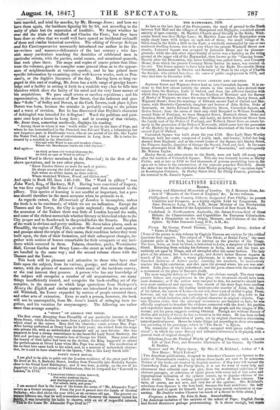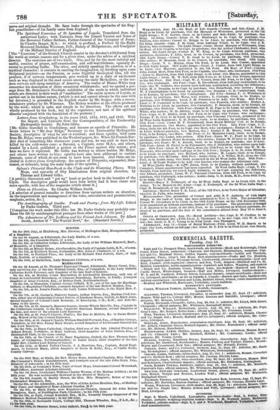PUBLICATIONS RECEIVED.
BOOKS.
Literary and Historical Memorials of London. By J. Homage Jesse, Au-
thor of "Memoirs of the Court of England," &e. In two volumes.
Phillipsland, or the Country hitherto designated Port Phillip: its present Condition and Prospects, as a highly eligible Field for Emigration. By John Dunmore Lang, D.D., A.M., Senior Minister of the Presbyterian Church, and Mernberof the Legislative Council of New South Wales.
Cooksland, in North-eastern Australia; the future Cotton-field of Great Britain: its Characteristics and Capabilities for European Colonization. With a Disquisition on the Origin, Manners, and Customs of the Abo- rigines. By John Dunmore Lang, D.D., A.M., &c.
Poems. By George, Powell Thomas, Captain, Bengal Army, Author of "Views of Simla.
[Some of the poems in this volume by Captain Thomas are curious for the criticst questions they suggest. The subject of " The Bark, or Bridal Party," the mast elaborate piece in the book, bases its interest on the practice of the Thugs.
The hero Azim, an Arab by blood, is betrothed to Leila, a daughter of his fatheeit Mend. Returning from seeking his fortunes in India, Azim and his train VS suddenly set upon by Thugs, and all strangled after the usual fashion. The lady pines at his absence, her father is angry, and Azim's father Hassan departs in search of his son. After a weary pilgrimage, he is shown by strangers the blanched skeletons of Azim's party; counting the numbers, he instinctively reaches the right conclusion, and dies upon the ground where his son was mur- dered. Leila pines in virgin widowhood; and the poem closes with the erection ef a monument on the place of Hassan's death. The more tangible defects in "The Beret" are obvious enough. The story want; greater fulness and completeness in the plan: the treatment should have been
more dramatic; or if the author were unequal to this, his narrative should have
been more condensed and vigorous. The march of the story flags from neediest and diffuse descriptions; the leading incidents—the murder of Azim, the death of his father, the sorrow of Leila—do not tell, from want of skilful display. These, however, are not the curious questions we have alluded to: they refer to the manner in which imitation sinks all original character in original subjects. Cap-
tain Thomas states that the principal occurrences are founded on fact; he was officially employed to translate the evidence connected with the deed; his position and experience must render him familiar with the_people and the images of Irmi
dostan; yet his poem suggests nothing Oriental. Though not without fluency of diction and melody of verse, he has no vocation to the mese. Ile has been incited to write verse by his admiration of poets, not by original observation stimulating natural poetical power. Hence he treats things not according to their own natnrei but according to his prototype; which in "The Beret" is Byron. The remainder of the volume is chiefly occupied with pieces called "owl. sional"; in which the same fluency and imitative cleverness Is displayed, with a general want of original thought.] Selections from the Poetical Works of Geoffrey Chaucer; with a concise Life of that Poet, and Remarks illustrative of his Genius. By Charles D. Deshler.
Spenser and the Faery Queen. By Mrs. C. M. Kirkland, Author of " New Home: Who'll Follow?"
[Two American publications, designed to introduce Chaucer and Spenser to the notice of Transatlantic readers; by whom those bards are said to be unknown, Neither of the books are wanted by English readers: if they have left unread the Canterbury Tales and the Fairy Queen, it is not for want of every help and allurement that editorial care can give, from the modernized collection of the choicest passages, or selections of entire pieces with every aid of foot-notes and typographical indication of the syllabic sounds, up to popular editions of the whole works. There is nothing particular in either of these volumes. Thn facts, of course, are not new, and very few of the opinions. Mrs. Kirkland's selections from Spenser is the best book, because the least ambitious: the lady` allows the poet to speak for himself, her prose being merely explanatory or con- necting. Mr.Deshler makes Chaucer too much of a theme to write about.] Progress; a Satire. By John G. Saxe. Second edition. [An American imitation of the satirists of the school of Pope; English Bards and Scotch Reviewers perhaps predominating. It is clever enough, but wanta
nerve and original thought. Mr. Saxe looks through the spectacles of his Eng- lish grandfather-if his family came from England.]
The Spiritual Exercises of St. Ignatius of Loyola, Translated from the authorized Latin; with Extracts from the Literal Version and Notes of the Reverend Father Rotham, Father-General of the Company of Jesus; by Charles Seeger, M.A.: to which is prefixed, a Preface by the Right Reverend Nicholas Wiseman, Di)., Bishop of Melipotamus, and Coadjutor of the Midland District of England. [The " Exercises" of the Romish Church consist in the devotee's withdrawal from the world at certain seasons and for a given time, under the advice of a spiritual director. The exercises are of two kinds. One, and by far the most rational and useful, consists of prayer, self-examination, and self-watchfulness, specially di- rected to prevailing faults. The other, and strictly speaking the exercise, is of a mystical character: it consists in exciting the imagination, by dwelling upon some Scriptural incident-as the Passion, or some frightful theological idea, till the penitent, if of nervous temperament, gets worked up to a state of excitement such as was displayed in the mad scenes among the early Methodists, or the mo- dern revivals and camp-meetings of America. The reader of Blanco White may remember his description of these occasional withdrawals; and we quoted a pas- sage from Mr. Steinmetz's Novitiate exhibitive of the mode in which individual minds are directed in their work of" meditation." The entire system of Loyola, as carried out in its fullest extent, (which is not and cannot always be the ease with lay devotees,) is presented to the English reader by Mr. Seeger, with a recom- mendatory preface by Dr. Wiseman. The Bishop wonders at the effects produced by the work; which is calm and simple in its directions. The effects are not wholly produced by the book, but by the experience and tact of the spiritual director conjoined with the fanaticism of the penitent] Letters from Greefenberg, in the years 1843, 1844, 1845, and 1846. With the Report, and Extracts from the Correspondence, of the Enniscorthy Hydropathic Society. By John Gibbs. [Mr. Gibbs travelled to Grrefenbe' rg and became an apostle of Priessnitz. He wrote letters to "My dear Ridge," Secretary to the Enniscorthy Hydropathic Society, descriptive of what he saw or received; and these epistles, with some from Mr. Ridge, were published in the Wexford papers, &c. When Sir Francis Bur- dett died of something like threescore years and ten, be was said to have been killed by the cold-water cure: a Baronet, a Captain, some M.A.s, and others, headed by a Lord, published a protest in the Times against this notion; and here we have it reprinted. Mr. Gibbs has written to others besides Mr. Ridge, and others have written to him; epistles have also been addressed to various journals, some of which do not seem to have been inserted. And these are in- cluded in Letters from Grcefenberg; the system of Priessnitz, expounded, illus- trated, or defended, being the main topics of the epistles.] Sylvan's Pictorial Handbook to the Clyde and its Watering Places. With Maps, and upwards of fifty Illustrations from original sketches, by Thomas and Edward Gilks.
[A prettily illustrated and "got up" hand or pocket book to the beauties of the Clyde. 'the descriptive guide would have been better had it been closer and more specific, with less of the magazine article about it.]
Hints on Elocution. By Charles William Smith.
[A selection of general remarks or directions from various writers on elocution, on the improvement and management of the voice, articulation and pronunciation, emphasis, action, &c.]
The Autobiography of Goethe. Truth and Poetry : from My Life. Edited by Parke Godwin. Third part.
[Completes the work under this title; but Mr. Parke Godwin may probably con- tinue the life by autobiographical passages from other works of the poet.]
The Adventures of Mr. Ledbury and his Friend Jack Johnson. By Albert Smith, Author of " The Wassail Bowl," &c. (Standard Novels.)



























 Previous page
Previous page